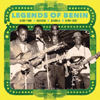 Analog Africa has unveiled another lovingly assembled and lavishly packaged overview of funky lost recordings from the birthplace of voodoo. Tireless German vinyl-monger Samy Ben Redjeb has already tackled Benin once (with last year’s excellent Orchestre Poly-Rythmo compilation), but Legends of Benin aims for a somewhat broader survey. This compilation is devoted to four legendary composers from that country's strikingly fertile period of 1969-1981: Gnossos Pedro, Antoine Dougbé, El Rego et Ses Commandos, and Honoré Avolonto.
Analog Africa has unveiled another lovingly assembled and lavishly packaged overview of funky lost recordings from the birthplace of voodoo. Tireless German vinyl-monger Samy Ben Redjeb has already tackled Benin once (with last year’s excellent Orchestre Poly-Rythmo compilation), but Legends of Benin aims for a somewhat broader survey. This compilation is devoted to four legendary composers from that country's strikingly fertile period of 1969-1981: Gnossos Pedro, Antoine Dougbé, El Rego et Ses Commandos, and Honoré Avolonto.
Analog Africa
Among the four composers compiled here, Honoré Avolonto is likely the most prolific and commercially successful. Consequently, he had the good fortune of being backed by some the more amazing and influential bands in Africa (such as the aforementioned Orchestre Poly-Rythmo and Ignace de Souza’s Black Santiago, both of which make appearances). All three of his tracks here are excellent, but the infectious Afrobeat of “Tin Lin Non” is probably the best (although the instrumental breaks in “Dou Dagbé Wé” are pretty damn sizzling too).
Conversely, the least known of the composers represented is Antoine Dougbé and this compilation inadvertently provides ample evidence to justify his marginalization. While he is the inventor of Afro cavacha (a hybrid of Latin music, Congolese rumba, and Beninese voodoo percussion) and apparently a record-collector favorite, most of his tracks are relentlessly cheery and poppy. Oddly, however, his reggae-influenced “Nou Akueunon Hwlin Me Sin Koussio” is one of the album’s clear highlights due to its wild and ambitious percussion fluorishes (although the chorus sounds disconcertingly like The Animals’ “House of The Rising Sun”). As an aside, Dougbé is an excellent example of an unusual quirk displayed on this compilation: none of the four featured artists adhere too closely to one style. Consequently, I was occasionally surprised by great tracks by artists I thought I could write off (and less frequently, vice-versa).
El Rego et Ses Commandos are famously responsible for being the first Beninese band to incorporate American soul and funk into their sound. While their “Feeling You Got” and “Vimado Wingnan” are two of the more influential and sought-after tracks in Benin’s history, their sound is quite Westernized (James Brown’s shadow looms particularly large here). That said, it is easy to see why they had such an impact, as they display an enormous amount of energy and exuberance. Despite that, I vastly prefer their understated bossa nova-tinged “E Nan Mian Nuku” to the rest of the tracks presented. I'm probably no fun at parties.
The last of the four featured composers is Gnossas Pedro, who is best known for popularizing modern agbadja, which is an inspired mutation of a three-piece percussion rhythm traditionally used in burial ceremonies. Redjeb has included Pedro’s first ever agbadja recording—the opening “Dadje o Von O Von Non” from 1966—but it is more of a historical curiosity than a great track: the rhythm is certainly propulsive, but the vocals are a bit on the sing-song side and the whole thing feels more like a vamp than an actual song. Thankfully, Pedro later makes up for it by contributing two the best tracks on the album: the laid-back funk groove of “Okpo Videa Bassouo” (which features some killer smoky sax hooks and an insanely tight and virtuousic rhythm section), and the sultry closer “La Musica en Verité” (which absolutely decimates the rest of the album).
As with everything released by Analog Africa, Legends of Benin is generally quite exceptional. Of course, it doesn’t quite have the success rate of African Scream Contest, but several of the weaker tracks have historical importance, so Redjeb’s decision to include them makes sense (sometimes musicology and funkiness are lamentably at odds with one another). Perhaps Redjeb is reaching the bottom of Benin’s treasure trove of forgotten funk vinyl, but the rare photos, biographical information, and handful of brilliant tracks should make Legends extremely difficult to resist.
samples:
- Gnossas Pedro and His Dadjes Band – "La Musica en Verité"
- Honoré Avolonto and Orchestre Poly-Rythmo – "Tin Lin Non"
- El Rego et Ses Commandos – "E Nan Mian Nuku"
Read More

